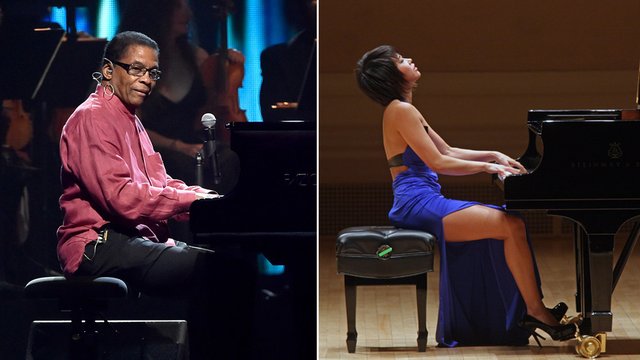Should I Learn Jazz or Classical Piano?
Choosing between learning jazz or classical piano can be a daunting decision for aspiring pianists. Both styles offer unique challenges and rewards, making it essential to consider your goals and preferences before diving into your musical journey. In this blog, we'll explore the differences between jazz and classical piano, helping you decide which path aligns best with your aspirations.

Jazz piano is often associated with improvisation, creativity, and spontaneity. Unlike classical piano, which emphasizes precise interpretation of written scores, jazz encourages musicians to explore their musicality through improvisation. Learning jazz piano involves understanding chord progressions, scales, and rhythmic patterns, allowing for greater freedom of expression on the keyboard. Jazz pianists develop a keen ear for harmony and melody, honing their ability to interact with other musicians in a dynamic and collaborative setting.
Should I Learn Jazz or Classical Piano?
- Musical Versatility: Jazz piano teaches adaptability and versatility, as musicians constantly reinterpret and reinvent melodies and harmonies.
- Creative Expression: Improvisation fosters creativity and allows pianists to develop a unique musical voice.
- Understanding Music Theory: Jazz theory delves deep into harmonic structures, providing a comprehensive understanding of music theory principles.
- Collaboration: Jazz often involves playing with other musicians, fostering teamwork and communication skills.
- Personal Growth: The improvisational nature of jazz encourages self-expression and personal growth as a musician.
If you are interested in learning music check out our Music Lessons in Tempe.
Classical piano tradition is rooted in centuries-old compositions from renowned composers like Bach, Mozart, and Beethoven. Learning classical piano involves meticulous attention to detail, with an emphasis on reproducing the composer's intentions faithfully. Pianists master techniques such as dynamics, articulation, and phrasing to convey the emotional depth of classical compositions accurately. While classical piano repertoire offers a rich tapestry of musical masterpieces, it typically requires adherence to written scores without significant room for improvisation or deviation.
- Technical Proficiency: Classical piano training hones technical skills, including finger dexterity, hand coordination, and control.
- Interpretive Skills: Classical pianists develop the ability to interpret and convey the nuances of composers' intentions through precise execution.
- Historical Appreciation: Studying classical piano exposes musicians to a vast repertoire spanning different musical periods, fostering an appreciation for musical history.
- Discipline and Patience: Mastering classical pieces requires discipline, patience, and perseverance, instilling valuable life skills.
- Solo Performance Opportunities: Classical pianists often perform solo recitals, showcasing their mastery of intricate compositions to audiences.
Ultimately, the decision to learn jazz or classical piano depends on your musical interests, goals, and learning style. If you're drawn to improvisation, creativity, and collaborative music-making, jazz piano offers a vibrant and dynamic path. On the other hand, if you're passionate about interpreting classical masterpieces with precision and nuance, classical piano may be the perfect fit. Some pianists even choose to explore both styles, integrating elements of jazz improvisation into their classical performances or vice versa.
Jazz piano, with its emphasis on improvisation and spontaneity, offers a sense of freedom and experimentation that resonates with many musicians. The ability to spontaneously create melodies, harmonies, and rhythms fosters a deep connection to the music and allows for endless possibilities of expression. Jazz pianists often find themselves exploring various genres within jazz, from swing and bebop to fusion and contemporary styles, each offering its own set of challenges and inspirations.
Furthermore, learning jazz piano isn't just about playing the notes—it's about understanding the language of jazz. Pianists delve into jazz theory, learning about chord voicings, substitutions, and improvisational techniques. This deeper understanding of music theory not only enhances their jazz playing but also translates to other musical endeavors, enriching their overall musicality.
In contrast, classical piano training emphasizes precision, discipline, and interpretation. Pianists devote countless hours to mastering complex compositions, meticulously refining their technique and expression to convey the composer's intentions faithfully. The classical repertoire spans centuries of music history, offering a wealth of masterpieces to explore—from the Baroque intricacies of Bach to the Romantic lyricism of Chopin.
Classical pianists develop a profound appreciation for the composers' genius and the historical context of each piece they perform. They strive to achieve a balance between technical prowess and emotional depth, seeking to evoke a range of emotions through their playing. Solo performance opportunities abound in the classical world, with pianists showcasing their skill and artistry in concert halls around the world.
Ultimately, whether you choose to learn jazz or classical piano, both paths offer immense opportunities for growth, expression, and fulfillment. Some pianists may find themselves drawn to the improvisational nature of jazz, while others may gravitate towards the timeless beauty of classical repertoire. Whatever your preference, the journey of learning to play the piano is a deeply rewarding one, filled with endless possibilities for creativity and self-discovery.
Whether you choose to pursue jazz or classical piano, embarking on either journey promises a fulfilling and enriching musical experience. Both styles offer unique opportunities for growth, expression, and appreciation of the rich tapestry of musical traditions. Ultimately, the most important factor is to follow your passion and immerse yourself fully in the joy of creating music, whether it's through the spontaneous improvisation of jazz or the timeless elegance of classical repertoire. So, should you learn jazz or classical piano? The answer lies within your heart and musical soul.
If you like this check out our article: Why Does Jazz Sound Bad?
